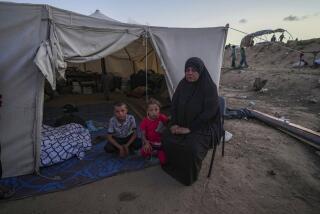War Comes Home to a Croatian City on a Surreal Day : Yugoslavia: Jets sweep over Zagreb and fire rockets. Below, it’s white wine and sugar cookies.
ZAGREB, Yugoslavia — Monday was the day when Yugoslavia’s quickening war between Serbs and Croats came home to a city under siege in the heart of Europe.
Twice the sirens wailed, and twice Yugoslav air force jets swept over this hilly, tree-lined city of 1 million that is capital of the breakaway republic of Croatia.
For the people who endured them, the air raids were part World War II, part suburban family life gone underground--and all surreal.
There was confusion, there was fear. There were rockets, and there was a lot of white wine and sugar cookies.
It all happened on a day when fierce battles erupted in Croatia, only hours before a European Community peace broker was to arrive.
Heavy fighting with mortars and artillery broke out overnight in many parts of the breakaway republic, bringing the death toll in clashes since Saturday to more than 40, Reuters reported.
The fighting broke out as Lord Carrington, chairman of an EC peace conference on Yugoslavia, was due to arrive for talks with Serbian President Slobodan Milosevic, Croatian President Franjo Tudjman and federal Defense Minister Veljko Kadijevic. The talks, Reuters said, are expected to take place at a secret site on the Adriatic coast today.
But in Zagreb on Monday, the first sirens sounded at 11:35 a.m. They caught people by surprise. Hundreds leaped from chairs at outdoor cafes lining Zagreb’s graceful main square. They ran up a hill to a bomb shelter built half a century ago for another war.
“I remember World War II,” said Mari Cerovecki, 56, one of those who fled to the tunnel shelter. “This is worse because everywhere else there’s peace. Only here there’s war.”
The siren sounded for the first time Sunday, but nothing happened. Monday’s alert came at the height of the business day. And it illustrated how ill-prepared Zagreb is for a war that has mocked all efforts to stop it.
Even as anxious hundreds piled into the tunnel, small knots of people clustered by the door. Some mumbled that they would rather die from a bomb blast than from a lack of oxygen farther inside. After 15 minutes, people had to push just to get past the doorway.
“At the front, it was like ants,” said civil defense official Darko Susnjcic, squeezing his fingers against his thumb.
Why weren’t people told to stay away from the doorway? Susnjcic gave a long shrug. Townsfolk were still pushing their way inside when the all-clear sounded.
“We’re all afraid--for our children, our husbands,” said Jadranka Petranovic, 35, a secretary in Zagreb. “It’s worst when you’re not together and don’t know where your children are.”
Though clashes between Croatian forces and Serbian irregulars take place as close as 20 miles away, Zagreb remained unscathed by the violence until the seizure of federal military installations began in the city over the weekend.
Though the federal army insists it has never fired first in the conflict, the Croatian government charges that the army has fought beside the Serb irregulars, lending the support of tanks and aircraft. Seizing the installations, the Croats say, is self-defense.
Monday’s first sirens, within 24 hours of the seizures, were triggered by two jets making a sweep over the city, Croatian government information officials said.
Amid worsening violence, Zagreb city officials said they have stockpiled food, water and medicine. In the last week, sandbags have been piled in front of cellar windows. Neighborhood civil defense committees are in place. At night in the city’s residential neighborhoods, total darkness falls over homes that dot the hillsides.
“We have a lot of places to hide thousands from attacks from the air,” said city official Mladen Vedris in a recent interview.
But the pervasive impression that the Yugoslav air force would not bomb the city gives the preparations an air of unreality.
Inside the city’s central shelter, preparations seemed lax. Although civil defense officials said 4,000 can be accommodated there, the shelter’s visible supplies consist of four cots, four first-aid kits, a few blankets and one 5-gallon jug of water. The defense officials said the shelter is intended for only short stays.
In the shank of a warm and humid afternoon, the jets returned. This time they came shooting, in what Croatian officials described as a rocket attack on radio and television antennas and military training centers atop Sljeme Hill north of the city.
In Zagreb’s Mlnovi residential district, parents just home from work bundled up their children and made for the basements.
In one house, two families drank white wine and spoke of tennis, shushing uncomprehending toddlers with sugar cookies until the all-clear came.
The homeowners seem better prepared, or at least more reconciled to bad times ahead, than Zagreb’s city fathers. Together with canned food, bottled water and candles, they have made their new bomb shelters bright and homey with the simple addition of wrought iron furniture that once drowsed on peacetime patios.
More to Read
Sign up for Essential California
The most important California stories and recommendations in your inbox every morning.
You may occasionally receive promotional content from the Los Angeles Times.










